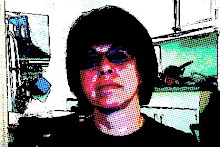Friday, August 19, 2005
Kitchen Confidential
A proper saute pan should cause serious head injury if brought down hard against someone's skull. If you have any doubts about which will dent--the victim's head or your pan--then throw the pan right in the trash.
I'd thought at first that this book was a cookbook, and when I realized it was the "Bad Boy Chef's" autobiography, I was disappointed but for a nanosecond.
I enjoyed Kitchen Confidential and could relate to it, even though my experience with restaurants has mostly been that of an eater. First, it's funny and reads almost cinematically: You can imagine Jack Black playing the crazed baker Adam Real-Last-Name-Unknown, wrestling with a huge fermenting machine while the Ramones blare in the background.
Second, in the chapter "A Day in the Life" where Bourdain gives a detailed description of what it takes to run the kitchen at Les Halles, he could be describing doing the production on an off-Broadway show or getting a periodical to print, both of which are familiar to me.
And third, he's about my age and made his bones in his chosen field at the same time that I was breaking into the wonderful world of fringe theaters, corporate temping and comedy clubs here in New York City: the Yuppified, coke-addled 1980's. In the chapter "Owner's Syndrome and Other Medical Anomalies," he tells us how four out of five restaurants fail, and the changes the owner makes as the business goes into its death throes:
He thrashes around in an escalating state of agitation, tinkering with concept, menu, various marketing schemes. As the end draws near, these ideas are replaced by more immediately practical ones: close on Sundays...cut back staff...shut down lunch. Naturally, as the operation becomes more schizophrenic--one week French, one week Italian--as the poor schmuck tries one thing after another like a rat trying to escape a burning building
What he doesn't mention is that one of the things the owners tried in the 1980's was "Open Mike Comedy Night." Buoyed--or rendered delusional--by talk of The Comedy Boom, one dive after another would announce an open mike night. It would take about a minute and a half for the news to get out to the hundreds of stand-up comics all over the city, and the following week the dive would be full!...of comics, who would never buy anything.
So then the open mike night would go through its own death throes: You have to buy two drinks to watch yourself perform, you have to bring two people. Then they would change the promoter (usually another comic getting ten percent of nothing). They'd do that a few times. Then you'd be at some other dive and you'd be telling your peers, "Oh yeah, I've got a spot at The Hungry Taco next week" and one of them would say, "It closed."
"You mean they're not having comedy anymore?"
"I mean the whole place closed."
"Oh. I didn't know they were doing so badly."
And then the conversation would have devolved into "I hear they were mobbed up" and other speculations on why these things tank, most of us as clueless about why the businesses failed as we were about our acts not hitting. We saw the beleaguered restaurant staff as our allies in the battle of Them vs. Us, compatriots who would slip us an extra drink or a snack if they liked us or our acts. In fact, Bourdain would have been the kind of guy I probably would have dated a couple of times and then a few weeks later I'd be saying to my friends, "Oh, the chef? He was a little too...uh...chemically induced for my liking. And he...uh...broke my Billy Joel records."
The conversational style in Kitchen Confidential reminds me of another tough-talking writer who went to an Ivy League school, Richard Price. From me, that's high praise. The tough guy thing can wear thin after a while, though. Bourdain bashes those celebrity chefs to whom the celebrity has become more important than the food, but constant casual references to threats of murder, maiming and castration become as hackneyed as "fuzzy" Emeril's schtick.
Besides, when you look a little closer, under the outlaw and the tough guy are some good old fashioned values. He sings the praises of Bigfoot, a restaurant owner who instilled loyalty and accountability in his employees. He's quick to credit the real backbone of the restaurant business, the Central and South American line cooks who can tirelessly reproduce whatever the chef invents with accuracy and efficiency. The chapter, "So You Want To Be A Chef?" is practically a handbook on ethics and integrity. And for all the talk about casual sex, he's married to his high school sweetheart.
But he's right about the saute pan.
Bam.
